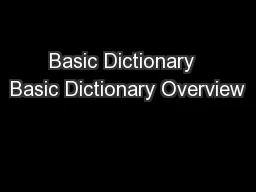PDF-Internet intermediaries: basic facts 5Types of intermediaries 6Types o
Author : lois-ondreau | Published Date : 2016-04-30
with each other Because of their technical capabilities internet intermediaries are under increasing pressure from governments and interest groups to police online
Presentation Embed Code
Download Presentation
Download Presentation The PPT/PDF document "Internet intermediaries: basic facts 5Ty..." is the property of its rightful owner. Permission is granted to download and print the materials on this website for personal, non-commercial use only, and to display it on your personal computer provided you do not modify the materials and that you retain all copyright notices contained in the materials. By downloading content from our website, you accept the terms of this agreement.
Internet intermediaries: basic facts 5Types of intermediaries 6Types o: Transcript
Download Rules Of Document
"Internet intermediaries: basic facts 5Types of intermediaries 6Types o"The content belongs to its owner. You may download and print it for personal use, without modification, and keep all copyright notices. By downloading, you agree to these terms.
Related Documents














